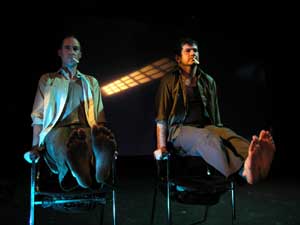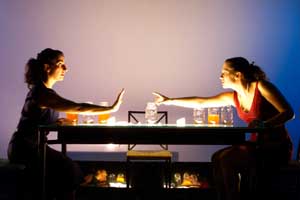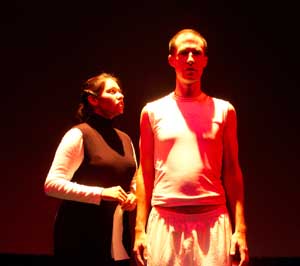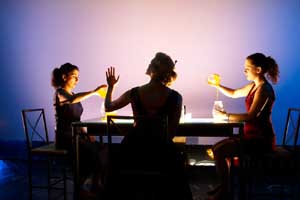Arts & Entertainment
A good actor is worth a thousand words
Nu conveys volumes without uttering a peep
Published Thursday, 06-Nov-2003 in issue 828
Visual poetry is part dream, part visceral inspiration — and part blood, sweat and tears. With their world premiere of Nu (French for naked/nude), Sledgehammer Theatre brings their set of visual poems to San Diego audiences in a baring of the soul that helps us discover the truth of our inner selves.
Nu consists of three short plays, none of which contain any dialogue – actors communicate solely through physical expression. The first and third pieces were conceived and directed by Sledgehammer Theatre Director Kirsten Brandt; the second piece was conceived and directed by Associate Director Jessa Watson.
Mr. Phosphorescent, the first ensemble piece, could be called the “office,” in that many emotions intrinsic to the corporate workplace are explored in this ‘silent’ play. The physicality is acted with human form against a screen of larger images. Without words, we are forced to concentrate upon the exacting body language within the script. Closed hands, smiles, and momentary contact underscore a greater meaning to the context. The visual communication is accessible, clear and revealing. And for anyone who has worked within the suffocating atmosphere of corporate America, it is frightfully painful.
“Let your eyes and ears feast upon the physical text of this local debut.” Easily identified are the supplicant (complete with dog chain), the corporate climbers (literally climbing on one another’s backs), the office romance, and the brown-noser. Choreographed movements add to the story of imperfect human beings working in a defined pattern that is restrictive, dehumanizing, and impossible for many. Masks become an effective tool in relating how the soul must restrict individual politics to play a more effective game of office politics. Quite moving.
Echoes Traveling begins with the fluid movements of the ensemble. All too apparent to the others in the representational group, one appears to escape from the mold and move to freedom (of choice and action). Contortions from the remaining group seem to indicate their discomfort with the one who has escaped from the confinement of conservative restrictions. The piece seems to shout out a warning to liberal beings that when you break from the pack, you may suffer the loss of their protection and may be branded — like a scarlet woman — as a traitor, and marked for humiliation and restriction in society. Although there is a surface theme of prohibited love, the play maintains the universal theme of the fear of exploring individuality on many different levels.
This third play, Wintering, was inspired by the poetry collection Ariel by Sylvia Plath. It plays quite nicely to the injured, delicate mind of the poet. The world seems to be a split personality of tendencies and inner feelings that allow you to cry or laugh at life or life’s circumstances. An actor within a slowly moving doorframe on the second level seems to represent the non-participant in life, while others in the ensemble cast drink from life’s offerings and measure out merriment, heartache, and other human emotions from the same pitcher of life. Though we drink from the same waters — it seems to say — individuals are affected differently.
The lighting design by David Lee Cuthbert was quite effective. He juxtaposed intense color against a larger screen that spelled out the overall concept of each piece while isolating individual actions with pinpointed white or yellow lighting.
Paul Peterson’s sound design captured and complimented the very capable ensemble troupe of actors with the heartbeat of each piece. The machine-like sounds of the first play complimented the movements and feelings of Mr. Phosphorescent very well. Peterson’s use of varying tempos for the second piece captured the idea of freedom and eventual recapture. For Wintering he used stringed instruments to underscore the highs and lows of deep pain and momentary exhilaration, along with chimes that may have suggested the natural healing winds of life.
Brandt and her company succeed in moving from linear storytelling in this non-verbal theatrical local debut. Let your eyes and ears feast upon the physical text of this local debut.
Nu plays through Nov. 11 at St. Cecilia’s Playhouse. Call (619) 544-1484 for tickets or information.
|
|
Copyright © 2003-2025 Uptown Publications





